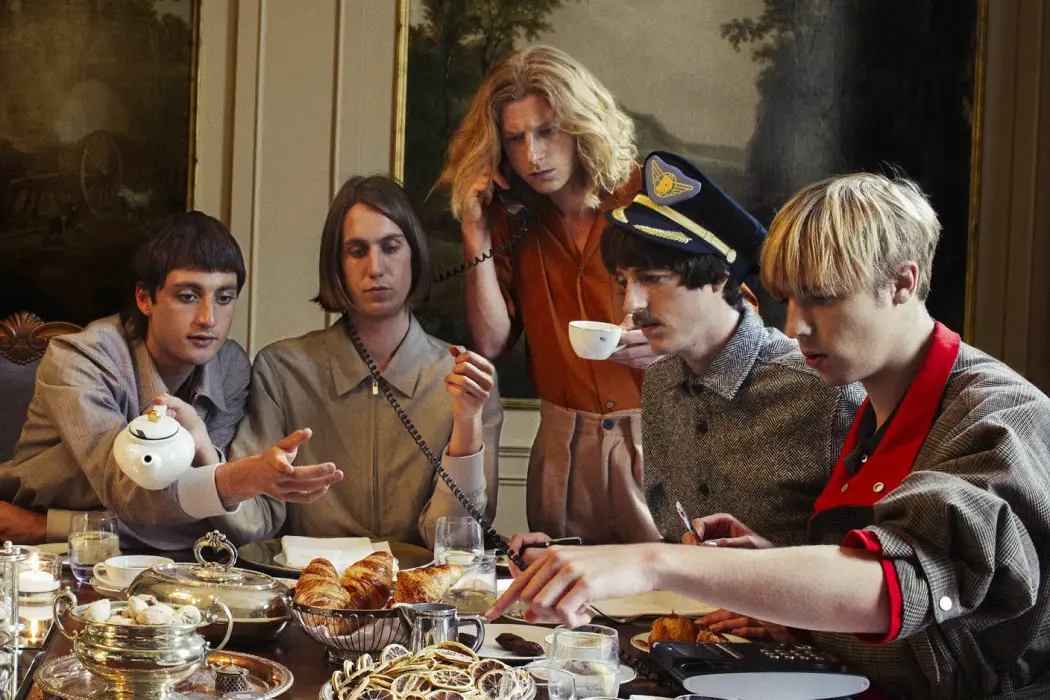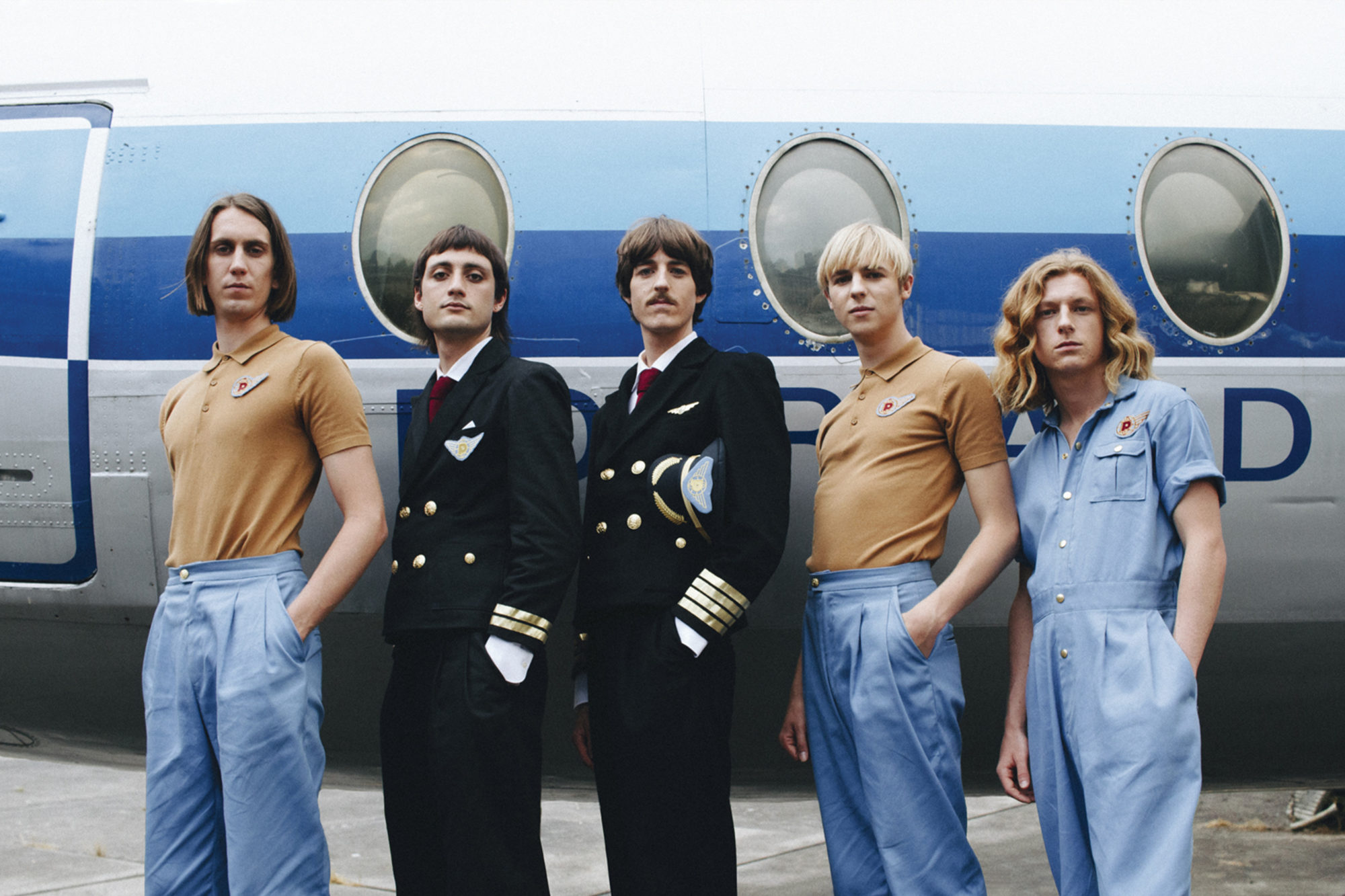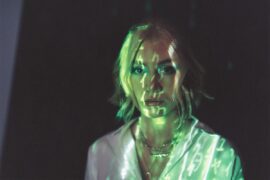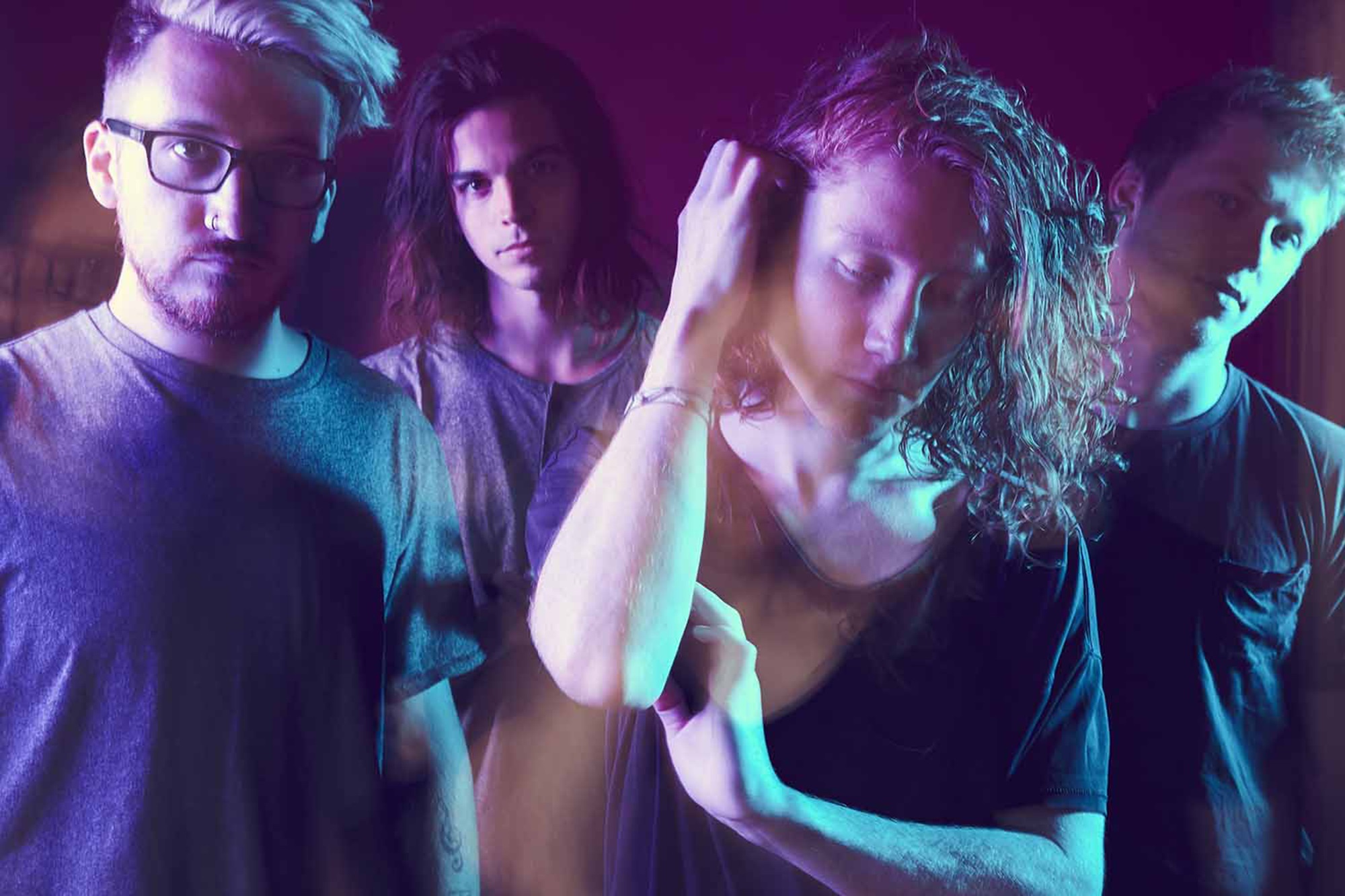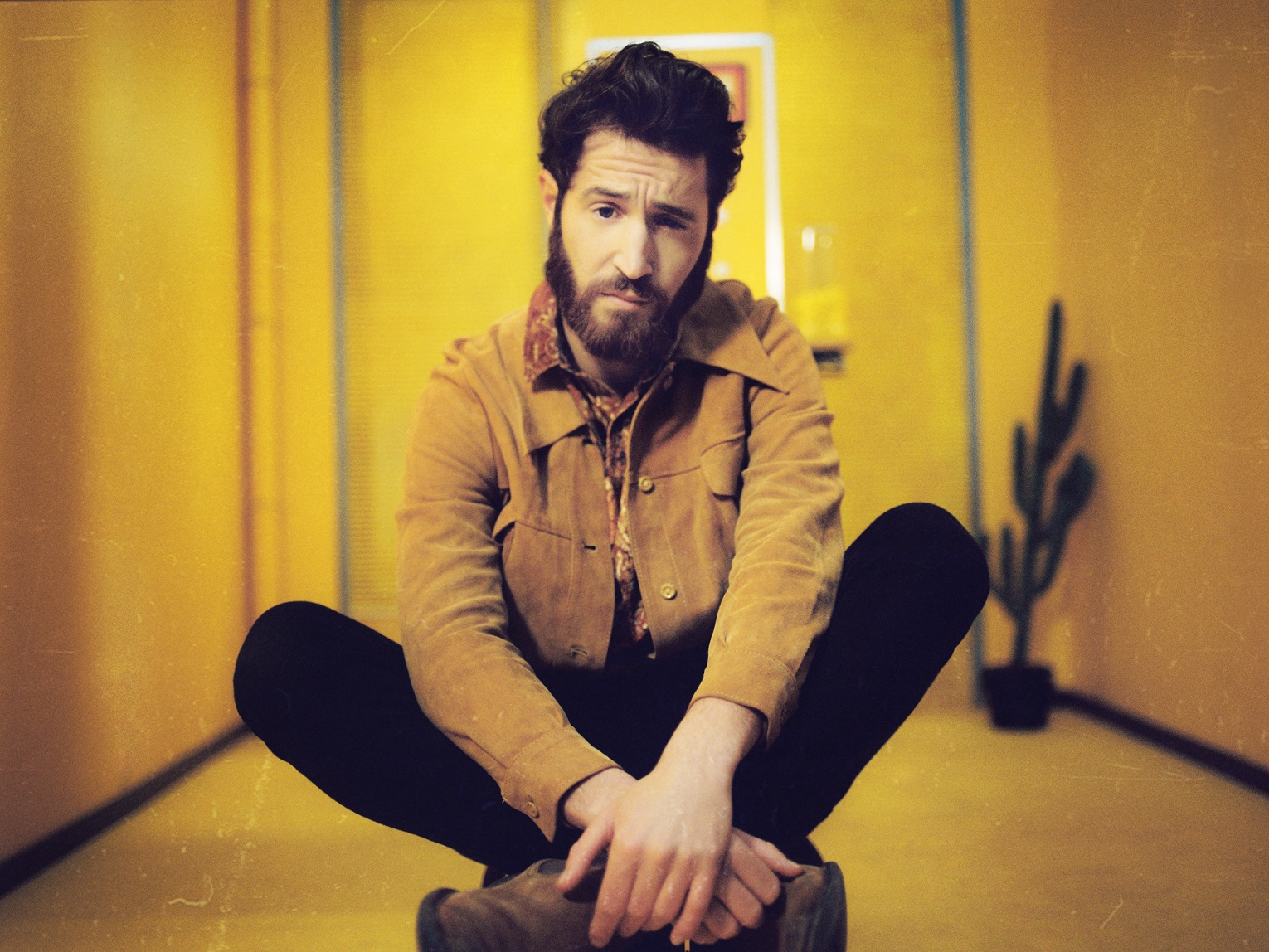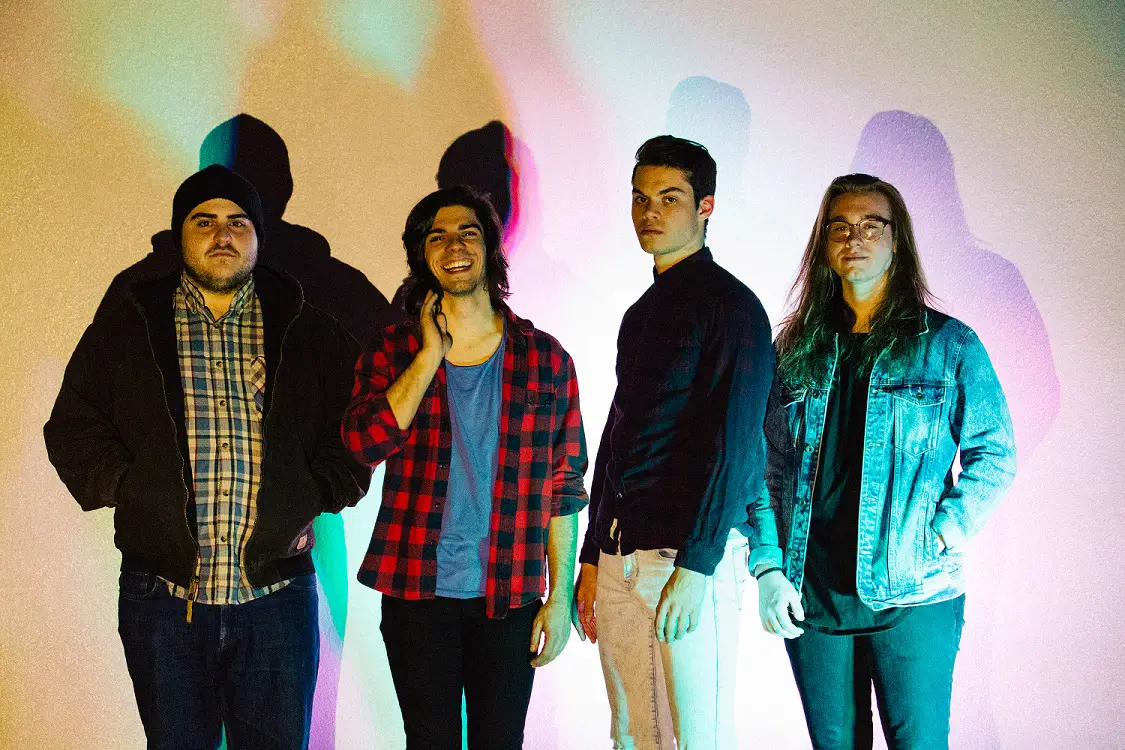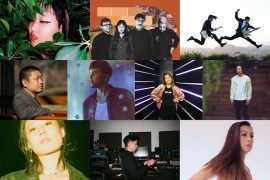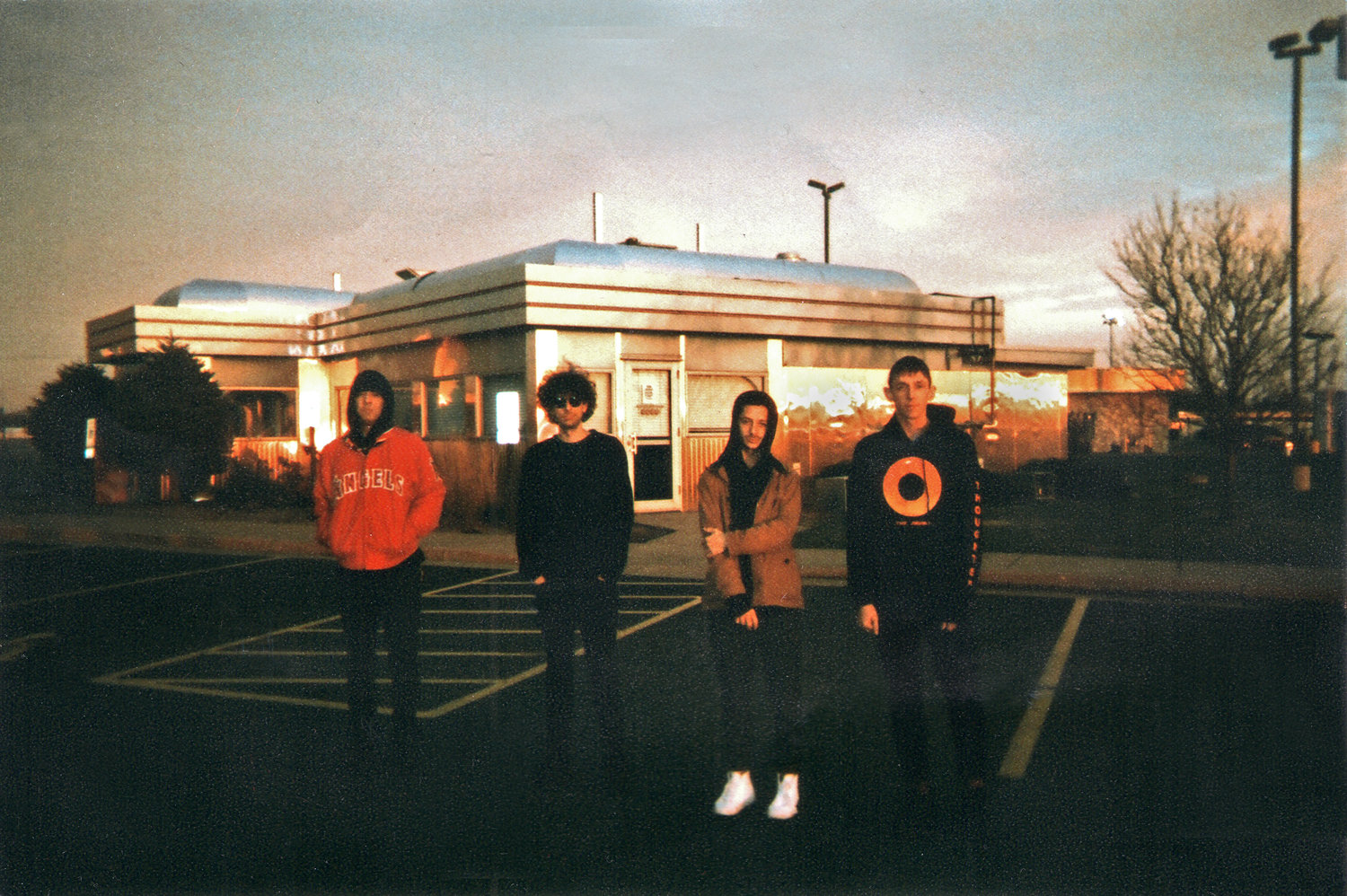Groovy “pop” band Parcels discuss the eclectic influences that define their intoxicating genre-defiant music and one-of-a-kind artistry.
Upon first listen, Parcels’ intoxicatingly groovy music doesn’t sound like the product of our time; in fact, there’s very little to compare it to at all, making them hard to characterize but fun to love. Hailed by various outlets as “disco-pop,” “funk” and “modern pop,” the Berlin-based Australian band pride themselves in taking inspiration from everywhere and making it current – as well as groovy.
“Grooviness was always important for the music,” remarks Jules Crommelin. With his dark moustache and mop-top hair, the Parcels guitarist bears a striking resemblance to Sgt. Pepper’s-era George Harrison. In fact, all five Parcels members — from Crommelin, to Louie Swain (synth), Patrick Hetherington (synth), Noah Hill (bass), and Anatole “Toto” Serret (drums) — feel a bit like emissaries from the past, evoking deep ’70s vibes in style and sound. Even their album cover – which depicts the five Aussies disembarking from a plane – could be interpreted as a tribute to The Beatles and Led Zeppelin.
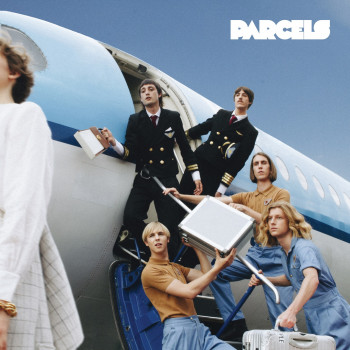
Formed five years ago in Byron Bay, Australia, no sooner had Parcels’ story begun than the quintet left home and emigrated to Germany. Parcels were a strictly electronic music group at the time, making Berlin and its bustling electronic scene an ideal fit; but as they progressed, Parcels slowly came to embrace live instruments, incorporating them into their recordings and performing with them at live shows.
At this current juncture, Parcels’ music reflects a blend of both worlds — that of the computer-tinkerer, and that of the “classic” live band — and their far-flung influences span the past sixty years of musical history, encompassing The Beatles, The Beach Boys, The Wrecking Crew, Supertramp, Steely Dan, Chic, and beyond. They take from mid-century exotica and American bluegrass, funk, electronic, and more. Seldom has there been a band that takes from everything, but sounds like nothing we’ve heard before.
Released October 2018 via Kitsuné / Because Music / Caroline Records, Parcels’ self-titled debut album Parcels is a stunning representation of this standout band, their exceptional music, and their unique artistry. The songs flow into one another with striking cohesion as Parcels weave their way through indulgent rhythms and effusive melodies, all with dazzlingly bright vocal harmonies that transport listeners to another world.
The response to Parcels has been swift and emphatic: They’ve amassed over 75 million streams globally, and following their headline European tour last fall, Parcels are about to embark on their first North American headline tour (dates and more info below), playing to sold-out crowds in New York, Montreal, Minneapolis and more. Parcels will also be playing Lollapalooza, Governors Ball, and Coachella music festivals this summer, bringing their eclectic, cinematic, and meticulously-finessed music to a wealth of new ears who, like myself, won’t know what hit them.
During a recent visit to New York City, Parcels’ Jules Crommelin and Louie Swain sat down with Atwood Magazine to share their story, discuss their influences, and explore the ins and outs of their debut album. Get to know Parcels in our exclusive interview below, and don’t miss this singular band on tour in 2019 (click to jump down)!
:: stream/purchase Parcels here ::
A CONVERSATION WITH PARCELS
Hey guys! First of all I just want to say, when I first heard Parcels' music, I was convinced you were some Motown band from the 1960s I had missed.
Parcels: Not at all, really! Our early music was very electronic; I don’t know any ’60s bands that sounded like that.
Maybe it’s in discovering you from your album. I heard “Tied Up Right Now” and was completely taken aback! What were your influences for this album?
Parcels: From a whole bunch of things; I guess the ’60s Motown thing was a recent discovery, but also 1950s and ’60s exotica music is definitely a part of it, and country music coming from around that time, too – bluegrass, etc.
The very romanticized chordal changes in the background the violin swells
Parcels: That’s the exotica touch, where all of the instruments sound very far away and warbly and all. That, as well as later ’60s Beatles, Beach Boys stuff we’re inspired by, and then… everything else! ’70s, ’80s, ’90s… We tried to mark in moments of all our influences into the album.
Parcels, to me, is such a unique band because it really feels like it's from another time, whether it's the past or future. It's not music one would expect to hear today, and that's really exciting.
Parcels: I get it, because at the moment pop music seems very insular. Everything sounds the same, so we get that a lot actually! A lot of people are very refreshed to hear pop music that’s a little bit off the trend.
Why do you think that's been the case for you and your band?
Parcels: We just cringe a lot, hearing a lot of modern stuff! There’s so much to look back on in the past, of amazing music – mainly because it has survived the test of time. I guess all the music that comes out now hasn’t been tested by time yet, so we’re just bombarded with everything that’s happening.
I actually think about that often: Who are the bands and artists I hear and see today -
Parcels: – that are going to define this period!
It's so difficult, because there are so many more names today!
Parcels: I think always, the biggest and most influential ones will stick out and survive the test of time. Hopefully we’ll be one of them – I don’t know, though!
You named your first album Parcels, and I do feel like an eponymous record is a stepping stone a lot of artists eventually reach. Why did this feel right to bear that name?
Parcels: We didn’t really decide it until most of the album was recorded, so it wasn’t that we set out to make the self-titled album – although we had it in the back of our minds, because there’s a whole bunch of things that come with the debut album, for us. We come from a very classic band approach to how we do things. I think it’s just from music we’ve grown up listening to: The first album is usually self-titled. This is who we are! You know? It’s a classic move; it’s a statement. It bring a bit of grandness, too; without even putting it out, the artwork and the name already make it feel bigger than it is! Also, we didn’t want to go on a huge conceptual tangent with our first album; it didn’t make sense to us. We love the idea of concept albums and telling a story, but I think we can get into that later on. Parcels is animated enough in an instrumental sense; it doesn’t need a poetic thread through the whole thing.
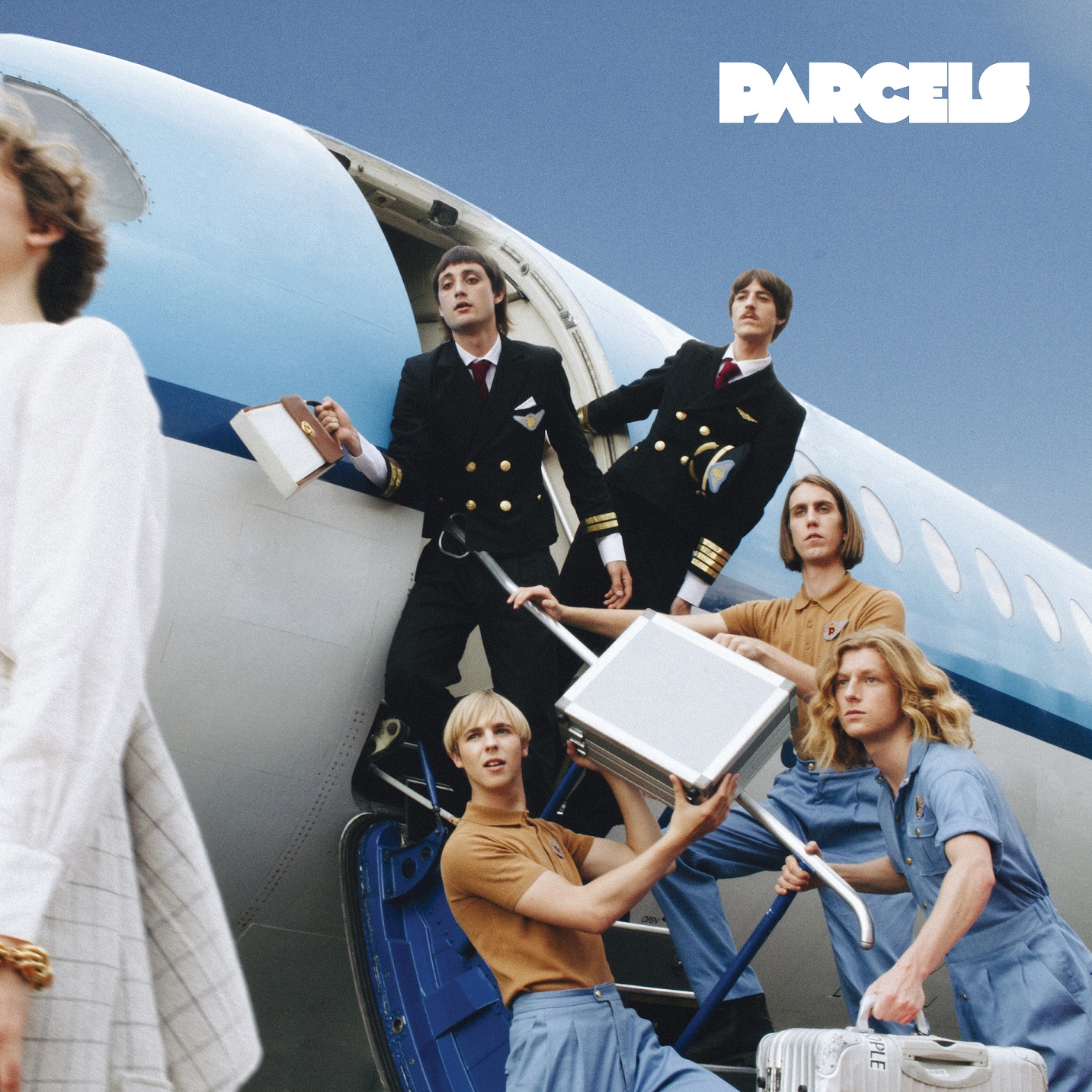
Taking a step back, you started in Byron Bay and then found yourselves in Berlin. What brought you from Australia to Germany?
Parcels: It was pretty random, Berlin as a choice, but very shortly after we got there we met our manager and a pretty cool team of people. We kind of fell in love with the city and the people, and how cheap it was… It’s become clear, over a few years, that it really is the right place for us – but it wasn’t due to any sort of planning!
I know you came out of electronic music, which is at home in Berlin - so it is, in some ways, your scene, and in some ways it isn't.
Parcels: That was the main attraction when we first moved over. When we started Parcels it was very much more on the idea of making electronic music only, and then – I don’t know; we expanded! I mean, very much of the album is electronic, but we just grew from that.
Were you trying to make it sound electronic, though? It doesn't sound like an electronic record, to me; it doesn't sound like it was made on keyboards or synthesizers.
Parcels: Because we did it in the studio, and we spent a lot of time on it… There are a lot of live elements in there, too. It’s a bit of both: The things that are electronic kind of fit in with the live elements, so it’s hard to actually tell what is electronic and what’s not. A lot of the drums are electronic, for example.
What are some of the live elements?
Parcels: The bass, guitar, and keyboard. The “groove thing.” I mean, I don’t want to leave Anatole [Serret] out on drums because he is a part of it too. The live groove is drums, bass, guitar, and keys, but some of the song have electronics too – electronic bass…
And part of the process of creating the record was owning the production for the entire thing?
Parcels: For sure, we wanted to have full control.
How much of being in Parcels these days is staying up 'til three o' clock in the morning, moving little nodes up and down a blue screen?
Parcels: That was essentially my life, for a while! In my room, staying up very late… and then, the next process was being in the studio and doing the same thing. It was month and months… a lot of work.
Making music these days is fascinating to me: You're expected to give 100% in front of people, or you're on the computer making music like that. They don't sync.
Parcels: It’s pretty ridiculous. They’re polar opposite, but it’s really important that you do both, I think – for us anyway. We can’t just be in the studio the whole time, otherwise we’d go crazy. You get a lot from the crowd, understanding what is a song that hits – it’s the real tangible way of understanding that.
Would you say that Germany's music scene had an impact on your sound?
Parcels: Ever so slightly, from the electronic DJ scene. It was the first time I’d listened to good electronic music. I love the sound of distorted drum machine, proper ’80s electro. Hearing that for the first time was super inspiring, and it made its way into the music in some way.
How did you transition to the electronic music you were making when you arrived in Berlin, to the funk and soul sounds we hear today?
Parcels: The grooviness was always important for the music. I think, once we stopped wanting to limit ourselves to being an electronic band, it was natural… We kept the groove element of it, and saw where else we could take the sound. We pigeon-holed what we wanted to do at the start; we were always playing live, and then in the end we just realized it’s just better if we play it live, because maybe that’s what we’re better at. People were reacting a lot at live shows, and that was us playing all the parts ’cause we actually didn’t know much about electronic music. We just only knew how to play live together, and that seemed to be what people responded to. It’s all about the both, you know? I don’t think we’ll get rid of that electronic element; I really love electronic dance music – not EDM –
(laughs) There's a difference! Four years ago, that sentence would feel very funny.
Parcels: (laughs) Just condensing the word to EDM puts a full different sound in your mind. That’s a whole other thing; it’s not that. I mean “electro.” It’s become a bit more interesting. Because there’s so many more subgenres now, there’s more things to take from.
People have become accepting that you can do more than one.
Parcels: And people that are into electronic music have an awareness of everything that is happening, and can draw from influences. It seems weird that there was a time where someone was like, “I’m making deep house music and that’s it.”
The grooviness was always important for the music.
How do you incorporate vocals?
Parcels: We sing! Good old-fashioned singing. I guess that’s the most traditional part of our sound, is our singing because it came from us all singing in harmonies, like in folk music. I wasn’t quite there then – the rest were all in a folk band together, a year before Parcels started in 2013, playing loads like that, listening to Crosby Stills & Nash and stuff like that, which is all focused on vocal harmony. That’s really important for our music, and it’s so much fun to sing in harmony! It’s a huge challenge for us all, and it’s so much fun to work out. That’s why we’re inspired by the Beach Boys; they’re so intricate in vocal harmony – and they can all really sing, which is great!
So in 2013 you're making folk music, Patrick joins in 2014 and Parcels as we know it comes into existence... and you move to Germany?
Parcels: Six months! We played there gigs before we left – we basically moved as soon as we started the band! We were going to go to Europe anyway and we were going to play music anyway; Parcels just happened to happen just before we left, and so that was what we decided to focus on. We’d been in Byron Bay for years; it’s an incredible little town. It was either Melbourne or somewhere in Europe, and it was more exciting to go over there.
And now you're here, and you've released a debut album! Did you always intend to thread the songs on this record, the way they go into one another?
Parcels: I think we all love listening to an album that is cohesive from start to finish, and you don’t really know where a song ends and starts. We really wanted to explore that. Again, it’s the traditional way of looking at it: We really wanted to make an album. That’s what an album is, in our mind. It’s changed quite a lot these days, because it’s more interesting, in a financial sense, to put more songs on an album because of the whole streaming thing – but it’s got nothing to do with what we want. So we made an album album.
So what was it about “Comedown” and “Lightenup” that earned those two songs the opening spots on your debut?
Parcels: That’s an interesting one. “Comedown” was the first song I wrote for Parcels, about four years ago. It’s a real old – one of the earliest – and we’ve played that as our last song for three and a half years now, basically. The crowd just really loves it, and we used to get a lot of comments from fans saying, “You’ve got to record ‘Comedown’!” And we always thought of it as, we were like, “Fuck you, we’re not going to record it!” It’s a super cheesy song; why would we record that? We’re better than that!
And now it's the introduction to your debut album.
Parcels: “Comedown” and “Lightenup” used to be one song, and then we worked on it and made “Lightenup” out of the drop of “Comedown.”
When I'm not looking at my phone or computer, I don't notice the transition. I literally have no idea - I'll already be on “Withorwithout,” and have no idea how that happened!
Parcels: That’s how we play it live basically. “Bemyself” and “Credits” were also like that. We took a lot of time trying to connect them in an honest way. It’s a difficult situation; I mean, we were prepared in some sense, but you can definitely be more prepared for that.
How do you know where to put the song on the tracklist?
Parcels: It’s all in the feeling, experimenting. We listened to twenty different tracklists when we finished the album… I think that was our first argument in the whole writing process, was the tracklisting! Everybody has a different idea and vibe for what goes after, but we finally worked it out!
I really love “Withorwithout” for one of the reasons we already discussed - the harmonies! By that time in Parcels, one already has a sense for your sweet sounds - the synthesized violins, etc. In “Withorwithout,” those harmonies are golden! What inspired that?
Louie Swain: I don’t know; I guess Jules was never really a singer, so when he just started singing, he developed this great falsetto – before his full voice! I’m putting words in his voice.
Jules Crommelin: Yeah, I haven’t sung for very long. I sang for the first time for Parcels. I mean, it’s not all falsetto; Patrick can’t even sing in falsetto! That’s kind of how we work out the arrangements in a way. Because Pat can’t do the high octave, I do the high octave. And then Noah’s got quite a strong lower register voice, but slightly higher than Pat’s so he fits in there. Louie does like a low falsetto, usually.
Louie Swain: If you isolate any of the harmonies, they stand pretty ridiculous by themselves!
Another thing I really like about Parcels is that, I think you play with the idea of what a song can be. Some of the songs, like “Tape,” are just short snippets. Then there are others, like “Everyroad,” which is just so transformative. When so many songs are 3-4 minute insular entities, how did you get that part of your mind to shut down? How did you ignore that impulse to resolve?
Parcels: That was easy, because it was just the idea of make a debut album. It’s the fun part, in a way, because finally you don’t have to think about those boundaries like making a single – a 3.5 minute song. We can do anything!
But so many people I meet talk about writing 100 songs, and dwindling it down to the 10 they thought were the best.
Parcels: We did that, too; we wrote a lot of songs and whittled it down, but the idea of writing pop songs and extended progressive songs: We wanted all of that. It was just fun to go in all those different directions. If you look at like a Pink Floyd album, some of the tracks are twenty minutes and some are one minute. It’s just what came out of the album.
It's like you had a 40-minute canvas; what can we do with it?
Parcels: That’s definitely how it was. We wanted it to fit on one single vinyl; that was important.
What's your songwriting process like? How did some of these tunes come to life?
Parcels: It’s all very different for the album, actually. Mostly one person makes an idea on a computer, brings it to the band and it develops. We would play some of the songs and grooves live for a bit to develop them there, and then bring it back into the studio. Funnily enough, we hardly jam! We rarely sit there in a room and go, “Okay, let’s jam this through!” I mean, it’s groovy and it’s repetitive… I guess we tested all the grooves so that we could play them live; that helped with the arrangement a little bit. It’s got that jamming feeling, but everything’s highly thought out – like the live show! We’re never jamming live; we’re always very rigidly rehearsed.
We’re a bit against what bands are doing these days, which is everything to track and everything being very structured. We still play everything live without any backing tracks or anything, but at the same time we keep it rigid. We work out the set – kind of because audiences have come to expect that now: You need that structured groove for people.
You're like the electronic-based band who refuse to be electronic.
Parcels: Hopefully, yeah! Pretty much.
What about a song like “Everyroad”? It's so unique, with the way it changes over time...
Parcels: That was actually one we did jam with. I think if we sat in a studio and jammed out all the songs, they would all look a bit more like “Everyroad.” We always just get sidetracked, wanting to extend stuff… That was the goal.
To what do you attribute the success of songs like “Overnight” and “Tieduprightnow”? Those two have just blown up!
Parcels: I guess they’re the more traditional pop songs; they make people feel good. But who knows what’s going to hit the audience like the singles did?
Outside of the singles, were there any songs you were massively excited for people to hear for the first time on this record?
Parcels: Kind of all of it, but I was excited to see how people reacted to “Everyroad,” and so far people want to talk about it, which is cool. It’s great; I thought that track could just slip over your head and be like, “That was weird.” People seem to get into it, which is really cool.
I think it changes the mood of the record, taking us from one place to a new headspace. Individually, do you have any favorite moments on the album?
Louie Swain: I don’t know; I’ve listened it too much! I love the bit in “Closetowhy” when that gangster synth line comes in. Patrick was just late one night in Jules’ room with a new synthesizer, playing this really gangster-sounding West Coast synth line, and all of us just losing our shit! It was really fun.
Jules Crommelin: Yeah that was great! I like that too; that’s a good moment.
How do you describe Parcels to your parents or grandparents?
Parcels: I’d probably tailor it more into the stuff that they like, so the ’50s and ’60s influences. I’d go on about the Beach Boys and the Beatles.
I know Daft Punk had some influence on you; in terms of translating your older influences into the modern canon, did you look at any current peers to reference what they were doing?
Parcels: It’s hard to name specific influences for this, because I think when we try to go for a modern sound, we just have a broad idea of what the radio sounds like. I don’t think we could look to a specific modern artist to say we’re inspired by them. There are certain themes on this album that we jokingly took from urban pop – the end of “Everyroad” was kind of like that – but I would say Daft Punk, because they’re just a good example of making pop music and doing the same thing: Taking inspiration from everywhere, and making it current! And that’s what we want to do.
Challenging our ideas of what pop music is.
Parcels: Exactly!
What are you most excited about now that the album is out?
Parcels: Touring! We’re going to play some pretty big shows for the first time, so they’re very exciting. They’re way bigger – three times the size. We’re playing a venue in Berlin that we supported Two Door Cinema Club at years ago; now it’s going to be our own show. It just feels insane. We saw Tame Impala there, we saw Anderson Paak, and all of a sudden we’re playing there – it’s crazy, and it’s the same for venues in Paris and London.
The last year has just seen crazy things happening. It just doesn’t feel right that we’re playing those shows. It feels like we’re skipping some things, and we’re playing these venues… it doesn’t feel natural, and I don’t know if it ever will. I don’t know if you ever feel, “Yeah, this makes sense.” We’re just really focused on trying to make this new set amazing – a good show.
— —
:: stream/purchase Parcels here ::
— — — —
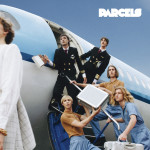
Connect to Parcels on
Facebook, Twitter, Instagram
Discover new music on Atwood Magazine
? © Antoine Henault

